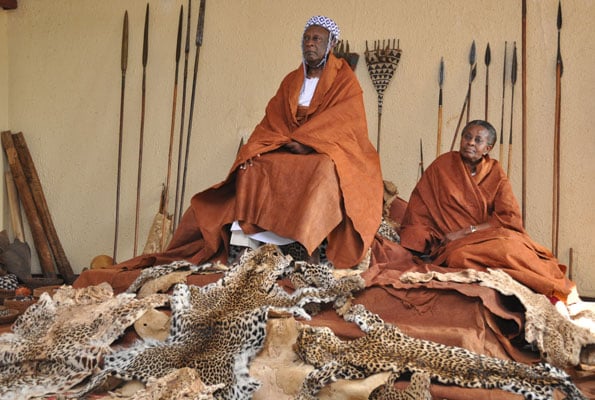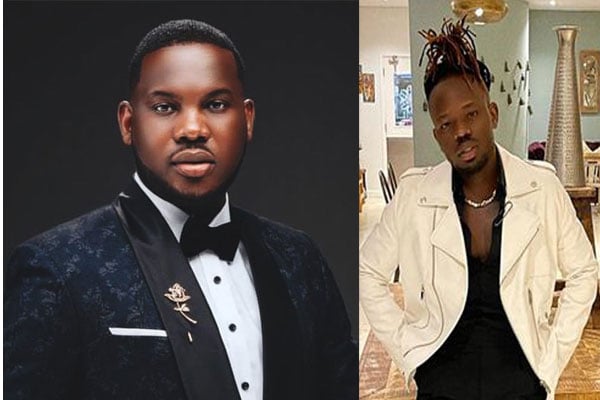Prime
Omukama Iguru: Bridging the past and present

The Omukama sits in the throne room, besides the Queen mother, during the recent Empango celebrations. The throne is where ceremonial functions performed, such as receiving delegates. Photo by Rachel Mabala
The Omukama of Bunyoro Kingdom, Dr Solomon Gafabusa Iguru, is the 27th king of the Ababiito Dynasty.
Iguru, the 62-year-old king is a son to Omukama Sir Tito Winyi, a fallen king who ruled Bunyoro from 1924 to 1967 when cultural institutions in Uganda were abolished under the Obote I regime.
He ascended the throne on June 11, 1994 at a coronation ceremony, traditionally known as empango when the kingdoms were re-established.
The enthronement was presided over by Bunyoro-Kitara’s traditional leaders led by the head of the kingdom’s regalia, traditionally known as Omukuru w’Ebikwato, Mr George Muhuruzi.
But his ascension did not come easy or automatically. He was only able to become leader after a one-year legal battle against accusations from his brother, Prince John Rukidi that he did not qualify to be king. Rukidi claimed that Iguru’s mother was a niece of his father.
History shows that the succession of Bunyoro kings has been fraught with succession battles.
Iguru’s grandfather, Kabalega, went through a brutal eight-month succession war with his brother Prince Kaabigumiire before claiming the throne.
Away from the battles, Iguru is very much a family man. The Omukama’s press secretary, Mr Henry Ford Mirima said, the king got married on August 24, 2002 to a 19-year-old Mutooro, Margaret Karunga Adyeri who had been selected for the king by the kingdom’s elders in Bunyoro-Kitara and Tooro kingdoms.
Mirima said the choice of a Mutoro Queen was not by accident.
“Omukama Iguru virtually ordered his advisers to look for a suitable queen from Toro Kingdom so that the traditional, cultural closeness of Banyoro and Batoro can be cemented,” he said.
The royal couple has two children.
Prince David Rukidi Mpuga was born on May 19, 2007 in Nairobi, and was baptised on December 27 the same year. Princess Masamba Nkwanzi was born on October 17, 2011 also in Nairobi, and baptised on June 27, 2012.
Besides being a cultural leader and trustee of the Banyoro, the king is culturally the head of metal workers in his kingdom.
“At his coronation anniversary, the king is given a hammer which he uses to hit a metal four times,” the king’s private secretary and royal researcher, Mr Yolamu Nsamba, says.
Documents in the kingdom’s libraries show several past kings managed trade and industries such as blacksmithing, iron ore and salt mining. Some instruments of ancient trade such as cowrie shells, ivory, hides and other essential commodities in trade are kept in the kingdom’s regalia.
A road leading to the Karuziika palace is well-paved and it leads you to a gate traditionally known as mugabante guarded by royal guards. It is also common to find the king’s cows, traditionally known as enkoroki, grazing in the compound. In the past, kings would stand at this gate to distribute cows and other items won after wars.
The Omukama’s private secretary who interacted with him before becoming King, said Iguru lived in the palace of his father Sir Toto Winyi in Masindi town but would socialise with people of all social, political and economic classes despite being a royal prince.
“I first met him at an educational conference at Masindi National Teachers College. He was and is still passionate about education,” Nsamba who has served the king for 19 years said.
A day in the life of the king
Iguru wakes up early in the morning to do his day-to-day activities but his lifestyle is quite unique compared to those of his people.
While still asleep, at about 4am, his courtiers (abatimbo) wake him up by drumming for him.
They drum and sing traditional Runyoro songs of praise and challenges faced by his kingdom.
Nsamba says that when the king rises up, traditionally referred to as kuhasuka, he freshens up and gets breakfast. At about 10am he begins official work when he starts receiving his people and delegations coming to among other things seek inspiration, arbitration and guidance.
Just like previous Bunyoro Kings, it is common for the king to sit at the entrance of his throne room where he receives delegations. His royal seat made of ancient ivory is put right at the front.
Nsamba, a cultural historian explains that ivory was a precious item of trade which ancient kings used to keep as reserves.
To date, the king jumps over this ivory whenever he is entering the throne room and whenever he is leaving.
Whereas the Banyoro use praise names such as Amooti, Akiiki, Atwooki, Ateenyi etc to greet each other, the king is not greeted. He is worshiped with various statements. Besides the first name and surname, each Munyoro, is given a praise name. However, it is only the king who reserves the praise name of Okaali.
The king has various praises attributed to him by his subjects.
He is referred to as mwebingwa (refuge of men) enkyanungi (good luck), emanzi (the hero), entale ya Bunyoro (the lion of Bunyoro), ekitule ekinobere abeemi (the stick that hates rebels), omukuma nfuuzi (the one who cares for the orphans), and rukirabasaija (the superior of all men).
“He does not reply but he takes note,” Hajji Bruhan Kyokuhaire, the kingdom’s education minister and former culture minister, says.
Besides governing his people, the king does rituals for preservation of Bunyoro’s cultures.
Ancient Bunyoro kings would take the trouble to collect natural medicine for common illnesses among their people such as herbs for malaria, cough and other diseases.
“It is of no surprise that Karuziika palace just like other ancient royal sites has several medicinal plants,” Nsamba says, as he points at various plants scattered in the compound.
After breakfast, the king sits in front of the throne room where he receives his subjects who have come to adore him and appreciate his contribution to the kingdom’s development by bringing presents for him.
During the interactions with this newspaper, the writer observed that the king is very attentive, does a lot of listening and little speaking. A soft spoken man, he gives brief and precise comments but while addressing the public he usually has a written speech.
The king may opt to directly talk to his guest or assign his ministers and officials to do so. At about 1pm, the king goes for lunch. It is taboo in Bunyoro for a king to be seen eating in public. After lunch, the king rests and then resumes work in the evening.
He at times spends the evening visiting his people, hunting or visiting his farms.
However he spares one day in a month where he participates in cultural rituals which includes visiting the regalia, where he sits on the throne.
While on the throne, the king welcomes advice from mainly his officials. Sources close to the king say he does this whenever he is about to make major administrative decisions such as appointments or travel outside his kingdom. Dr Iguru is also the chairperson of the Uganda Cultural Leaders Forum.
A social man
Despite having much respect and adoration, Iguru spares time to receive advice from elders and people from various walks of life.
“The king is accessible from Sunday to Sunday whenever he is in the palace,” Nsamba adds.
The kingdom’s deputy premier, Ms Proscovia Bamutura, says besides being a cultural leader of the Banyoro, the Omukama promotes industrialisation and education in his kingdom.
The Omukama has been articulate about the challenges facing his people and would love to see prosperity in his kingdom.
He has previously decried deforestation, poverty among his people, poor infrastructure and the unresolved historical land questions in Bunyoro. He attributes most challenges facing the kingdom to colonialists who defeated his grandfather, Omukama Kabalega in April 1899, who had resisted imperialism and was exiled in Seychelles.
Iguru claims that the colonialists deliberately destroyed the culture, and the industrial and agricultural sectors that thrived in his kingdom in the pre-colonial era, including depriving the Banyoro land ownership. Omukama Iguru says the historical injustices persist to date.
List of Bunyoro Kings (Babiito Dynasty)
Rukidi of Bunyoro - late 15th century
Ocaki of Bunyoro - late 15th/early 16th C century
Oyo Nyiba of Bunyoro - early s16th century
Winyi I of Bunyoro - early 16th century
Olimi I of Bunyoro- mid 16th century
Nyabongo of Bunyoro - mid 16th century
Winyi II of Bunyoro - late 16th century/early 17th century
Olimi II of Bunyoro - mid 17th century
Nyarwa of Bunyoro - mid 17th century
Cwamali of Bunyoro - mid 17th century
Masamba of Bunyoro - late 17th century
Anabwani I of Bunyoro, - late 17th century
Kyebambe I of Bunyoro - late 17th century
Winyi III of Bunyoro - early 18th century
Nyaika of Bunyoro - early 18th century
Kyebambe II of Bunyoro - early 18th century
Olimi III of Bunyoro - c. 1710-1731
Duhaga of Bunyoro - 1731- c. 1782
Olimi IV of Bunyoro - c. 1782-1786
Nyamutukura Kyebambe III of Bunyoro - 1786-1835
Nyabongo II of Bunyoro - 1835-1848
Olimi V of Bunyoro - 1848-1852
Kyebambe IV of Bunyoro - 1852-1869
Kabalega of Bunyoro - 1869-1898
Kitahimbwa of Bunyoro - 1898-1902
Duhaga II of Bunyoro - 1902-1924
Winyi IV of Bunyoro - 1925-1967
From 1967 until 1994 the monarchy was discontinued by the Ugandan government [2]
Solomon Iguru I - 1994–present
Source: Bunyoro Kingdom’s official website




